2006.03.03 11:48
Has anyone read Platform?
I like how the real estate cliche "location, location, location" is expanded in the travel industry to "packaging, packaging, packaging."
Maybe that's the same metaphor/cliche for "star" architecture these days.
"In the future, everything will be an advertisement."
--Rita Novel
"So what then is architecture? Is it a hard, 'simple', 'natural' protective shell that enenders the continuation of life? Or is it a soft formlessness forever redesigning an applied shell it doesn't naturally have?"
--QBVS1, p. 148.
2006.03.22 16:23
Architecture as Signal
Real architecture is all about seams that architects most often want covered up.
2006.03.22 16:40
Architecture as Signal
Maybe some architecture courses should be taught by blind people.
2006.04.24 13:03
magazine writer trying to identify the "leading" female architect today
"In the future, everything will be an advertisement [especially journalism?]."
2006.05.21 17:42
reading KINETIC ARCHITECTURE lately?
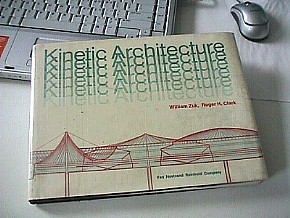
Anyone else reading
William Zuk and Roger H. Clark, Kinetic Architecture (New York: Van Nostrand Reinhold Company, 1970)
lately?
From the front flat of the dust jacket:
"Surely our present task is to unfreeze architecture--to make it a fluid, vibrating, changable backdrop for the varied and constantly changing modes of life. An expanding, contracting, pulsating, changing architecture would reflect life as it is today and therefore be part of it"*
Kinetic Architecture captures the very essence of the above statement. But more than that, it gives every architect, engineer, city planner and builder a working knowledge of emerging, evolutionary concepts and ideas which are flexible to the speed, scale, and nature of change today.
Fully evaluating the bold and exciting potentials of architecture which can accommodate time-change effects, the authors provide a wealth of supporting examples which show how man can now, for the first time, construct a physical environment that is adaptable to his specific needs.
Denouncing the "monument syndrome of static, permanent architecture" in light of current needs, the authors persue new architectural mediums which would remain responsive to a broad spectrum of changing conditions. Such buildings might expand, contract, or even move as pointed up in the book's numerous examples and illustrations.
Here you'll gain new insights into the principles and possibilities of dynamic self-erecting structures such as the United States Pavilion on Osaka, Japan . . . incremental structures which have the potential to meet changing pressures through additive, substractive, or substitutive capabilities (which suggest new ideas for the mobile home industry) . . . disposable buildings--a possible solution to cost-benefit problems . . . the merits of a "second-hand" building market based on the capabilities od reversible architecture . . . and many more equally fascinating innovations.
*"Editorial" by Jan Rowan, Progressive Architecture
2006.07.30 12:27
A Sketch of London
Just keep in mind, the older you get, the more future you've actually seen.
2007.01.16 15:14
Minimalism in Architecture
"ethical imperative" -- what a joke!
Oh yeah, the fight against the stain. "Shout it out!"
"In the future, everything will be an advertisement." Even minimalism.
2007.01.19 11:20
Museum Exhibitions (MOCA's Skin + Bones)
"In the future, everything will be an advertisement."
The advertising of Art images
Maybe the future is always a few years late.
2007.01.19 15:31
here's another Mies-runs-through-it design by OMA
mies wrapped around a factory
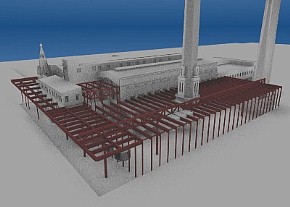
What's next? Kahn wrapped around Le Corbusier?
Koolhaas is so reenactionary. I love it!
2007.01.24 12:08
The age of technological revolution is 100 years dead
"In the future, your whole life will be a phone call."
| |
2007.02.10 09:59
Anyone support tearing it down?
note to self: In the virtual future all news will be delivered via the eye of the beholder.]
2007.02.19 21:04
what is today's movement?
"In the future, everyone will be a starchitect for fifteen minutes."

inspiring
2007.03.11 13:54
...and speaking of random tangents
So there I was, sometime in the January summer of 1987, walking through the deserted Capitol Building. The new Capitol was almost ready, but they still have to straighten the giant slanting flagpole erected the day before. Went through both Houses, and even sat in the Monarch's chair. And then, while looking at all the Prime Minister portraits hanging in the Central Hall, I leaned against this vitrine back in the corner. So what's this big, old document? "Hey guys, get a load of this. It's the Magna Carta!"
Australia's a trip.
Is the Athenaeum an unacknowledged(?) precursor of Deconstructionist architecture? Walked through every inch of that place sometime the middle of July summer of 1978. It was a Friday, construction almost done, and the place was deserted. Very attractive building. Gorgeous blue sky day.
Guess who wrote "Bizarre experiments are now a commonplace of scientific research."
[And speaking of commonplace bizarre experiments:]
"Only if virtual evolution can be used to explore a space rich enough so that all the possibilities cannot be considered in advance by the designer, only if what results shocks or at least surprises, can genetic algorithms be considered useful visualization tools."
--de Landa
You know, if a client came to me an asked for a rich space that would shock or at least surprise them, I certainly wouldn't need a genetic algorithm to accomplish the task.
Do you think I should donate my genetic code to science? I mean, what if they find it's totally random and completely tangential?!?
2007.03.11 14:35
...and speaking of random tangents
Getting something other than light to travel faster than light, there's the real challenge.
It sounds to me like they stretched a light pulse, rather than make it go faster. But, by all means, forget what I say before I even finish saying it.
Maybe now they'll start tearing down buildings before they're even finished construction. Hey, it's only a theory.
2007.03.12 17:05
...and speaking of random tangents
"In a sense Asimov, Heinlein, and the masters of American Science Fiction are not really writing of science at all . . . They're writing a kind of fantasy fiction about the future, closer to the Western and the Thriller, but it has nothing really to do with science . . . Freud pointed out that you have to distinguish between analytic activity. which by and large is what the sciences are, and synthetic activities which are what the arts are. The trouble with the Heinlein-Asimov type of Science Fiction is that it's completely synthetic. Freud also said that synthetic activities are a sign of immaturity, and I think that's where classical Science Fiction falls down."
--Ballard, Speculation, 1969.
Upon first reading this passage, thoughts of how Piranesi's Il Campo Marzio dell'Antica Roma and particularly the Ichnographia Campi Martii have been largely misinterpreted by 20th century architectural 'scholarship' came to mind. The synthetic quality of Piranesi's archaeology (before archaeology was formalized into a science) is all the critics/theoreticians saw, and they completely discounted the analytical aspect of Piranesi's archaeology. Basically, a non-analytical analysis resulted in a synthetic interpretation.
The wonderful thing about Il Campo Marzio dell'Antica Roma (including the Ichnographia Campus Martius) is that the distinction between the analytical and the synthetic is never manifest--the work seamlessly embodies both natures.
[note to self: think about an updated republication of "Theatrics Times Two" and "Theatrics Times Two, too".]
"Science now, in fact, is the largest producer of fiction. A hundred years ago, or even fifty years ago even, science took its raw material from nature. A scientist worked out the boiling point of a gas or the distance a star is away from the Earth, whereas nowadays, particularly in the social, psychological sciences, the raw material of science is a fiction invented by the scientists. You know, they work out why people chew gum or something of this kind . . . so the psychological and social sciences are spewing out an enormous amount of fiction. They're the major producers of fiction. It's not the writers anymore."
--Ballard, Speculation, 1969.
| |
2007.04.09 18:24
evolutionary architecture?
Stirling's evolutionary theory of architecture.
Perhaps what today's architects are really good at is designing buildings that evolve right into extinction.
2007.04.19 22:58
Featured Discussion: Volume
Well, since most people are behind the times, yes, the future.
2007.06.03 23:54
Archinect @ Postopolis!
I'd say a de-territorialized critic is even more dangerous.
2007.06.23 12:56
Anti-Starchitecture Chic
So, within the 'star system' who then are the "stars" and what form-buildings got the press? As large as the realm of architecture is, it's still a finite set, so we can actually be specific rather that general. Gehry, Koolhaas, Eisenman, Hadid--are these at least on the list of 'who is a starchitect'?
How buildings get press is what should be much more studied. For example, having "Guggenheim" attached to any building design will get lots of press because the Guggenheim already has a whole staff department devoted to generating press, besides the fact that the major mission of the institution itself is to exhibit. Ironically, the "Virtual Guggenheim" by Asymptote was pretty much literally just press.
If starchitects are really just pseudo celebrities, is that then already a sign of just how relative starchitect status is?
Is "a style" really such a bad thing? I actually see a lot of diversity from architect to architect, and even with a specific architect's oeuvre there is often diversity at least via nuance, if not actually just plain diversity. I thus question the full validity of "same bag of (increasingly superficial) formal tricks."
One could also argue that there is now-a-days a whole lot more critical architectural criticism going on, but it all right away falls into various camps--New Urbanism, Bilbao effect, anti-starchitect, etc.(?)
Most people I know know absolute nothing about architectural style. I'd go so far as to say that even most architects don't know all that is really going on design-wise now-a-days.
"Lesser known architects follow the public's new tastes."--that sounds very subjective to me.
"Architecture" loses yet another battle." --Is an imaginary battle really a battle? Can an imaginary battle really be lost?
I'll leave it at that, but I think the second set of points of regarding Archigram and backlash casts much too large a net, with big holes. Somewhat insular itself even.
parting shot:
Architects can well design buildings, put I don't think they'll ever be able to design clients.
2007.07.06 10:17
Bach and architecture
Is there here the suggestion that OMA (unwittingly?) hyper-reenacts Barock musik composition?
see the "Patent Office" within Content:
"Social Condenser" (1982)
"Strategy of the Void I" (planning) (1987)
"Timed Erasures" (1991)
"Loop-Trick" (1987)
"Strategy of the Void II" (building) (1989)
"Stacked Freedoms" (1989)
"Inside-Outside City" (1993)
"Disconnect" (1994)
"Everywhere and Nowhere" (1994)
Variable-Speed Museum" 1995)
"Inert Modified" (1997)
Tall & Slender (1996)
Skyscraper Loop (2002)
"Cake-Tin Architecture" (2002)
"End of the Road" (2003)
Do these design "patents" pass the Baroque Prenancy Test ?

Result: will a future building look like this?
| |
2007.07.11 16:45
Verb: Featured Discussion
Is it all still pretty operative criticism?
Perhaps architectural criticism needs to begin operating differently where:
some criticisms are extreme™
some criticisms are fertile™
some criticisms are pregnant™
some criticisms are assimilating™
some criticisms are metabolic™
some criticisms are osmotic™
some criticisms are electro-magnetic™
some criticisms are total frequency™
But maybe that will only happen when (we begin to realize that):
some architectures are extreme™
some architectures are fertile™
some architectures are pregnant™
some architectures are assimilating™
some architectures are metabolic™
some architectures are osmotic™
some architectures are electro-magnetic™
some architectures are total frequency™
2007.07.11 17:52
Verb: Featured Discussion
C(riticism) = m(ainstream)Ad(vertising)²
2007.07.12 12:41
Sarcastic Architecture
sarcasm 1 : a keen or bitter taunt : a cutting gibe or rebuke often delivered in a tone of contempt or disgust
The overall tone of Part II of Learning from Las Vegas is not one of contempt or disgust.
For example:
"Many people like suburia. This is a compelling reason for learning from Levittown. The ultimate irony is that although Modern architecture from the start has claimed a strong social basis for its philosophy, Modern architects have worked to keep formal and social concerns separate rather than together. In dismissing Levittown, Modern architects, who have characteristically promoted the role of the social sciences in architecture, reject whole sets of dominant social patterns because they do not like the architectural consequences of these patterns."
--p. 154, 2nd edition
This sounds to me like solid critique rather than contempt or disgust. And the whole texts reads more of solid architectural (because the text really is so rich with just talking about architecture) critique then some sort of sarcastically based evil plot.
2007.07.12 22:33
Sarcastic Architecture
MVRDV have an interesting way of taking things/concepts to an extreme. Have they maybe learned from "Exodux, or the Voluntary Prisoners of Architecture"? I like their imagination nonetheless. A breed of Dutch sarcasm utilized when most useful?
"Holy Stations of the Cross, Batman!"

2007.07.23 09:54
Selling Out: Architects and their Archives
commodify the artifact
virtualize and open source the archive
2007.07.30 19:16
Necessary architecture books
worth holding your breath for....
Towards a Squeezed-Out Architecture
Heavy Volume Everywhere
The Architect Came Twice (in foreign tongue)
One Size Fits All
2007.07.31 11:36
Learning from Las Vegas + SMLXL = Dubai
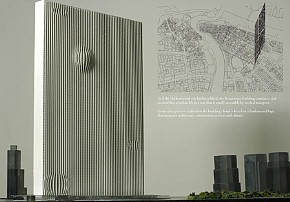
flip up

flip down
2007.07.31 17:55
Necessary architecture books
Not just reading other things, how about writing other things too? Architectural literature could be so much more creative.
2007.08.06 09:02
not looking forward to
I never went to grad school and all I do is "explore and expand upon my most deeply-felt interests."
2007.08.08 12:11
spreading like a virus...(discuss)
I wouldn't confuse the issue by right away associating 'newness' with 'stuff'. Concentrate on the newness factor, whether it's a brand new home or a renewed central business district, and start to imagine how newness can be somehow packaged differently.
2007.08.19 13:54
the future
"In the future everything will be a reenactment (in cyberspace)?"
2007.08.20 18:03
thesis... phenomenology
Is there any proof that "we can't inhabit it--outlandish, novel architecture--in a meaningful way"?
2007.08.21 12:22
"...a shift into spontaneous mode,
Marketing an architectural firm and designing to generate publicity are not the same thing.
2007.09.06
as architecture once was
I thought yesterday that Quondam could begin delivering its content as architecture once was. I have a whole collection of prints and books that show architecture as it once was, so I can start using them to exhibit architecture as it once was. And, of course, "quondam" actually means "once was".
The flip side is to also exhibit what architecture is going to be. Yet even the recent past is now architecture as it once was. I guess it's worth it to keep this idea as an ongoing agenda for Quondam, one of several agendas from now on.
| |
2007.09.22
Old School of New Thinking
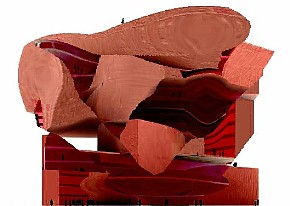
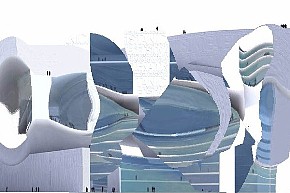
2007.10.02 21:40
innovative program
Figure out a way to make the new arrivals famous for 15 minutes. Perhaps ongoing guest spots on a perpetual reality NYC/TV show with lots of sink or swim competitions and flash-in-the-pan stuff. Fleeting fame really is the new normality.
2007.10.03 08:04
Looking for a Lebbeus Woods drawing ...
In the future, everyone will be a self link, with absolutely nothing to be sorry about. Self link architects will be all the rage, even.
And guilt will be the new mythology.
2007.10.03 08:16
thesis
I suggest you pursue all three topics in one--a marine architecture hi tech airport designed to make everyone feel like they're on stage. Throughout this great hybrid machine of notoriety are virtually infinite opportunities to globally link oneself.
|